News
HISTORIC: SENATE PASSES ENDA
10 Republicans join 54 Dems to approve pro-LGBT bill for first time
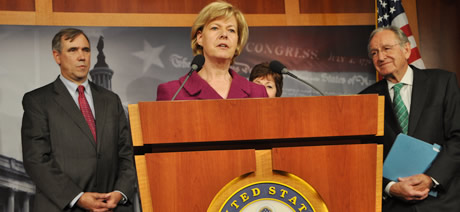
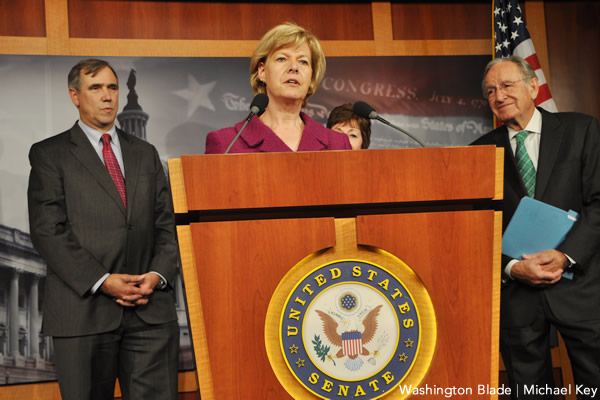
Sen. Tammy Baldwin (D-Wis.) is among the supporters of the Employment Non-Discrimination Act (Washington Blade photo by Michael Key).
For the first time in history, the U.S. Senate approved with bipartisan support a long sought piece of legislation that would bar employers from discriminating against or firing workers based on their sexual orientation or gender identity.
By a vote of 64-32, the Employment Non-Discrimination Act passed the Senate, marking the first time that either chamber of Congress has passed a version of the bill with protections for transgender workers.
A total of 10 Republicans voted in favor of the bill: Sens. Orrin Hatch (R-Utah), Susan Collins (R-Maine), Mark Kirk (R-Ill.), Rob Portman (R-Ohio), Pat Toomey (R-Pa.), Dean Heller (R-Nev.), Kelly Ayotte (R-N.H.), John McCain (R-Ariz.), Jeff Flake (R-Ariz.) and Lisa Murkowski (R-Alaska). All 54 Democrats present voted in favor of the legislation.
The vote also marks a turnaround for the Senate. In 1996, a version of ENDA came to the floor as part of a deal to bring up the Defense of Marriage Act for a vote, but the pro-gay bill failed at that time.
Prior to the vote, Sen. Jeff Merkley (D-Ore.), ENDA’s chief sponsor, delivered a speech on the Senate floor recognizing the historic nature of the moment.
“I look forward to this vote, this vote for liberty, this vote for freedom, this vote for opportunity, this vote for a fair and just America,” Merkley said.
Merkley also recognized the “champions of liberty” he said helped move ENDA forward like lesbian Sen. Tammy Baldwin (D-Wis.), Sen. Tom Harkin (D-Iowa) and Republican senators who joined in support of the bill.
Senators approved ENDA after three days of debate on the legislation, which began on Monday morning. Many senators spoke out in favor of the legislation ranging from Democrats like Sens. Barbara Boxer (D-Calif.) and Sherrod Brown (D-Ohio) to Republicans like Sens. Susan Collins (R-Maine) and Kelly Ayotte (R-N.H.).
Sen. Al Franken (D-Minn.) invoked the LGBT non-discrimination law in Minnesota as evidence the country can enact a similar statute on a nationwide basis.
“We have had this law in place for over 20 years in Minnesota, and what has been the effect?” Franken said. “For LGBT Minnesotans, it has meant that they don’t have to live in fear of being fired, or discriminated against in hiring, just because of who they are or whom they love. That is a big deal.”
The only senator to speak out in opposition to the legislation was Sen. Dan Coats (R-Ind.). On Thursday morning, Coats said he couldn’t bring himself to support ENDA out of concern for religious liberties of employers — despite the exemption in the bill for religious institutions.
“I oppose discrimination of any kind, and that includes discrimination of individuals or institutions for their faith and values, which often gets lost and has been lost in this discussion,” Coats said. “So there’s two types of discrimination here we’re dealing with and one of those goes to the very fundamental right granted to every American through our Constitution, a cherished value of freedom of expression and religion. And I believe this bill diminishes that freedom.”
Flake, who initially expressed opposition to the bill over its transgender protections, said he ultimately voted “yes” on the bill “to protect the rights of individuals.” In 2007, Flake voted as a U.S. House member for a version of ENDA with sexual orientation-only protections.
“While I had concerns about expanding protections beyond those House provisions, after consideration, I believe supporting this bill is the right thing to do,” Flake said. “I am hopeful that the bill moves forward in a way that works for employers as well as employees.”
McCain issued a similar statement saying he voted in favor of ENDA because of his opposition to employment discrimination.
“I have always believed that workplace discrimination – whether based on religion, gender, race, national origin or sexual orientation – is inconsistent with the basic values that America holds dear,” McCain said. “With the addition of an amendment I co-sponsored with Senators Rob Portman and Kelly Ayotte strengthening protections for religious institutions, I am pleased to support this legislation.”
Advocates praise vote, look to House of Representatives, White House
LGBT advocates heaped praise on the Senate for passing ENDA as they turned their attention to the House of Representatives, where Republican control makes passage significantly more challenging, and the White House.
Chad Griffin, president of the Human Rights Campaign, said the Senate made history “by standing up for a fundamental American truth.”
“Each and every American worker should be judged based on the work they do, and never based on who they are,” Griffin said. “This broad Senate coalition has sent a vital message that civil rights legislation should never be tied up by partisan political games.”
Tico Almeida, president of Freedom to Work, commended the Senate for approving ENDA on a bi-partisan basis and said the House should take the same action.
“The Senate has taken a bi-partisan and historic step toward ensuring that gay and transgender Americans have the same workplace protections that give all Americans a fair shot to succeed on the job,” Almeida said. “Our fight now moves to the House of Representatives where Speaker Boehner and the Republican Conference will have to decide which side of history they want to stand on.”
Both Griffin and Almeida said President Obama should follow up on the Senate vote by issuing an executive order barring federal contractors from engaging in LGBT discrimination.
Griffin said the directive would send a clear signal against “in support of workplace fairness” in addition to a House vote.
“This order is not a silver bullet, and ENDA is vitally necessary after the order is signed,” Griffin said. “But the Human Rights Campaign has long argued that, by signing the order, President Obama can extend workplace protections to over 16 million American workers.”
Tony Perkins, president of the anti-gay Family Research Council, responded to Senate passage of ENDA with dismay.
“Americans should be free to disagree, but ENDA would lead to a form of reverse discrimination,” Perkins said. “Anyone who expresses or promotes a view of family or morality that can be interpreted to be a disapproval of homosexual or transgender conduct will be subject to retaliation and discrimination.”
Despite claims like these from social conservatives, LGBT advocates have insisted that the bill would do nothing more than prohibit employers from discriminating against LGBT employees.
Speaking with the Washington Blade prior to the vote, Merkley said the task now for ENDA supporters is taking the momentum from the Senate to “create an irresistible pressure” for consideration in the House.
“With no shred of an argument to sustaining this type of discrimination, and a strong bi-partisan vote in the Senate, I hope we can create the pressure in the House to act,” Merkley said.
Similar to prior claims made by Senate Majority Leader Harry Reid (D-Nev.), Merkley predicted that ENDA would pass the House if Republican leadership held a vote on the legislation.
“I do believe that if an up-or-down vote was held on what we would pass through the Senate that it would pass the House,” Merkley said. “If a majority of the House is ready to say ‘no’ to discrimination, it is wrong for the leadership to block that vote, and I hope that they’ll come to see that view and allow such a vote to happen.”
White House Press Secretary Jay Carney addressed the vote on Thursday during his routine news briefing taking place at the same time, saying passage of ENDA in the House would be the “right thing to do because we’re all equal.”
“To oppose this kind of legislation is to announce that you want to be left behind by history,” Carney said. “The necessity of making sure that every American has equal rights is fundamental to our history and to who we are. And that’s what this legislation represents. Some of the objections that I’ve heard from members in the House are reminiscent of objections that opponents of other civil rights legislation put forward. And they were wrong then and they’re wrong now.”
The vote on final passage took place about 45 minutes after the Senate invoked cloture by a vote of 64-34 to end debate on the legislation.
The Senate earlier held a cloture vote Monday on ENDA, but that vote was to begin debate on the legislation. A second cloture vote was necessary to end debate and proceed to final vote.
ENDA amendments debated
Two amendments were also discussed with respect to the legislation. One was adopted, the other was not.
On Thursday, the Senate defeated an amendment proposed by Sen. Pat Toomney (R-Pa.) that would have expanded the groups eligible under ENDA’s religious exemption. That amendment, which required 60 votes to pass, failed on a 43-55 vote.
Prior to the vote, Toomey said his measure was an attempt to “strike an appropriate balance,” saying he opposes discrimination against LGBT people, but “another important American value is freedom, and particularly religious freedom.”
But Harkin spoke out on the Senate floor against the Toomey amendment for going too far. Noting ENDA already has a religious exemption, Harkin said if the Toomey amendment were approved, “thousands of for-profit businesses” would be allowed to discriminate.
Baldwin also said the expansion of the religious exemption that Toomey proposed wasn’t the appropriate balance.
“A capable employee in a non-religious [institution] should not be fired, or not be hired, because of his or her employer’s individual religious beliefs,” Baldwin said.
Sen. Lindsey Graham (R-S.C.) initially cast a vote “no” vote in opposition to the amendment. But just before the vote was called, he rushed into the Senate chamber to inform the clerk he wanted to vote “yes” on the measure.
Notably, even though his amendment failed, Toomey voted “yes” in favor of ENDA during final passage.
On Wednesday, the Senate adopted with no controversy by voice vote an amendment to ENDA, introduced by Sens. Rob Portman (R-Ohio) and Kelly Ayotte (R-N.H.), to ensure that institutions that invoke the religious exemption under ENDA won’t face retaliation from state, local or federal governments. LGBT advocates didn’t oppose the measure because they said it would simply reinforce the status quo.
Speaking on the floor, Ayotte commended the Senate for adopting the amendment to ENDA, which she said enables her to come on board in support.
“I have long been a strong supporter of the rights of conscience, of the rights under the First Amendment of the Constitution to religious freedom, and these protections are very important within this bill,” Ayotte said.
Two other amendments that were filed — one proposed by Sens. Mitch McConnell (R-Ky.) and Rand Paul (R-Ky.) to attach a national right-to-work law to ENDA, another proposed by Sen. David Vitter (R-La.) that reportedly would have banned sex-selective abortions — didn’t come up for a vote.
Merkley said only the Portman and Toomey amendments were allowed to come up as a part of a unanimous consent agreement reached on Wednesday.
Honduras
Corte IDH reconoce a Thalía Rodríguez como familia social de Leonela Zelaya
Se construyeron una familia tras más de una década de convivencia
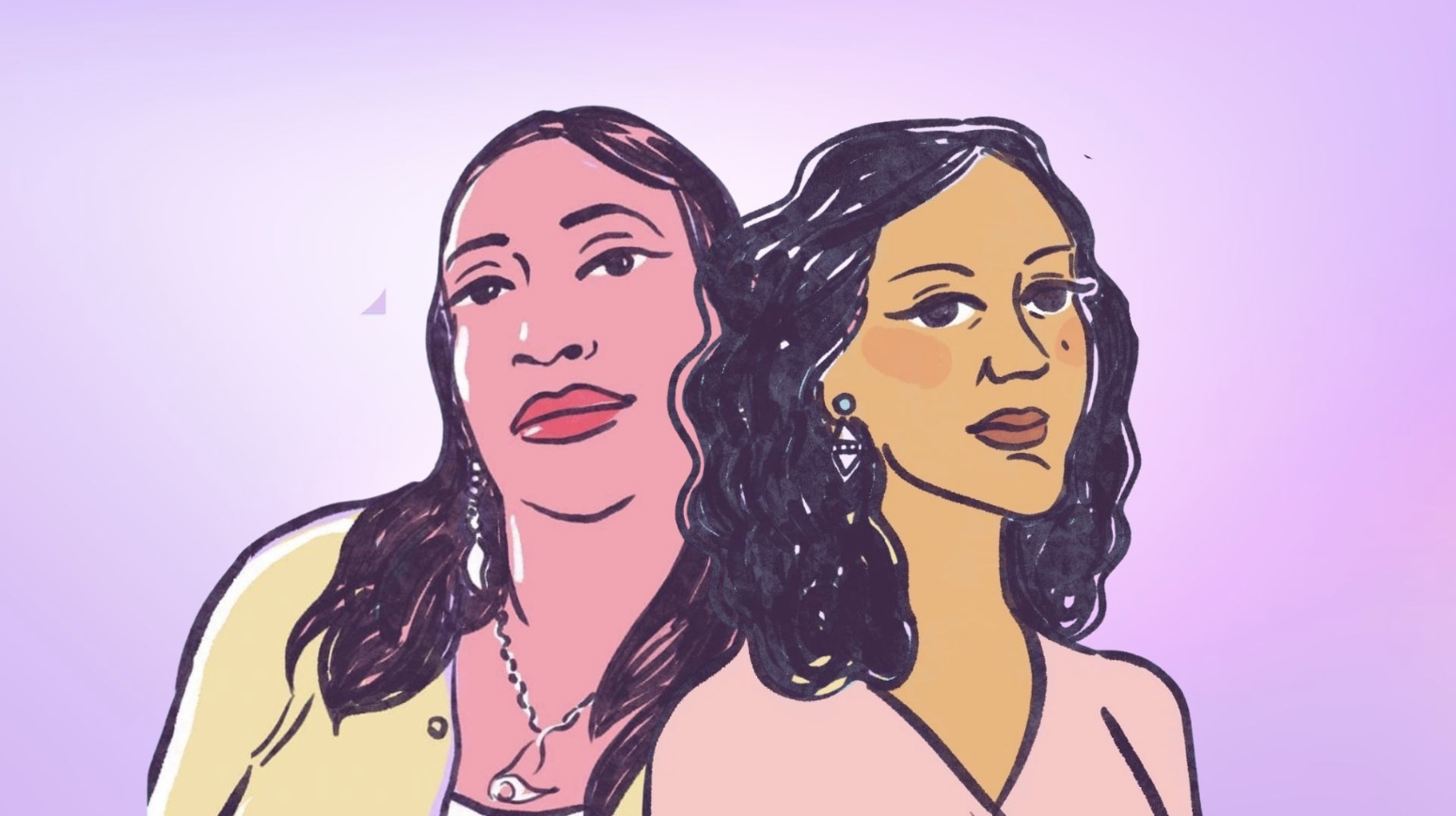
Por DORIS GONZÁLEZ * | TEGUCIGALPA, Honduras — En la sentencia del caso Leonela Zelaya y otra vs Honduras emitida por la Corte Interamericana de Derechos Humanos se estableció un hito jurisprudencial para las personas LGBTQ en Honduras, así como en la región en relación a las diversas conformaciones de familias existentes. La Corte IDH interpretó por primera vez el concepto de familia social, indicando que la construcción de familia no debe restringirse a la familia nuclear o a nociones tradicionales, bajo el entendido de que hay diferentes formas en las que se materializan los vínculos familiares.
Este análisis se trae a colación debido al contexto de discriminación, prejuicio y violencia que atravesamos las personas LGBTQ, el cual se puede manifestar incluso dentro de nuestras propias familias. Esta violencia se manifiesta a través de actos de odio como ser el desarraigo familiar, violencia física, psicológica, social, económica, expulsiones de los hogares, violaciones correctivas e incluso, culminando en muertes violentas. Esta violencia motivada por la orientación sexual, identidad y expresión de género de las personas imposibilita la convivencia familiar.
Ante esto, las personas LGBTQ construimos vínculos sociales fuera del vínculo familiar tradicional, los cuales a través de la convivencia, amistad, apoyo económico-social y construcción de vida en común constituyen familias, tal como ocurrió en este caso.
Tras el abandono de su familia biológica, Leonela Zelaya y Thalía Rodríguez construyeron una familia tras más de una década de convivencia, en los cuales se apoyaron mutuamente en diversas situaciones, viviendo como mujeres trans, portadoras de VIH, ejerciendo el trabajo sexual y en situación de pobreza, enfrentando constantes episodios de detenciones arbitrarias y violentas por parte de los órganos policiales.
Tras su asesinato, fue Thalía quien recogió el cuerpo de Leonela en la morgue de Tegucigalpa y quien gestionó el féretro a través de la Funeraria del Pueblo. Los servicios fúnebres de Leonela Zelaya fueron realizados en un bar por mujeres trans, trabajadoras sexuales, al cual no asistió ningún miembro de su familia biológica.
El asesinato de Leonela y la falta de esclarecimiento generaron a Thalía un sentimiento de inseguridad, frustración e impotencia. Por estas violaciones de derechos humanos, la Corte reconoció a Thalía Rodríguez, en calidad de familiar de Leonela, como víctima del caso, generando estándares aplicables a todas las personas LGBTQ.
A juicio de la Corte, esta situación lleva a que, en casos de muertes violentas de mujeres trans, las personas que integren las redes de apoyo de la persona fallecida puedan ser declaradas víctimas por la violación de sus derechos a la integridad psíquica o moral, siempre que se acredite la existencia de un vínculo estrecho con la víctima y una afectación a sus derechos, derivada, por ejemplo, de las gestiones realizadas para obtener justicia. Esta sentencia logra reconocer que las personas LGBTQ construimos familias sociales, familias elegidas, e indica que estas deben ser reconocidas y validadas.
* Abogada litigante del caso Leonela Zelaya y otra vs Honduras, Red Lésbica Cattrachas
District of Columbia
Eleanor Holmes Norton ends 2026 reelection campaign
Longtime LGBTQ rights supporter introduced, backed LGBTQ-supportive legislation
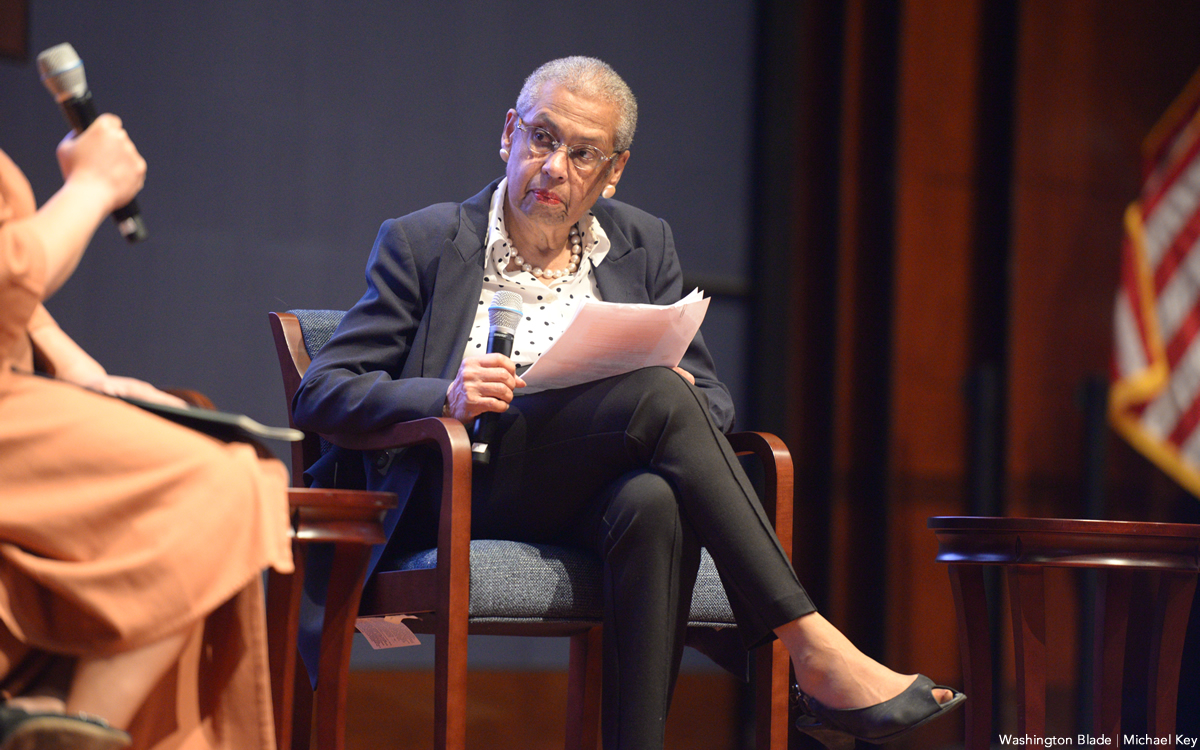
The reelection campaign for D.C. Congressional Delegate Eleanor Holmes Norton, who has been an outspoken supporter of LGBTQ rights since first taking office in 1991, filed a termination report on Jan. 25 with the Federal Elections Commission, indicating she will not run for a 19th term in the U.S. House of Representatives.
Norton’s decision not to run again, which was first reported by the online news publication NOTUS, comes at a time when many of her longtime supporters questioned her ability to continue in office at the age of 88.
NOTUS cited local political observers who pointed out that Norton has in the past year or two curtailed public appearances and, according to critics, has not taken sufficient action to oppose efforts by the Trump-Vance administration and Republican members of Congress to curtail D.C.’s limited home rule government.
Those same critics, however, have praised Norton for her 35-year tenure as the city’s non-voting delegate in the House and as a champion for a wide range of issues of interest to D.C. LGBTQ rights advocates have also praised her longstanding support for LGBTQ rights issues both locally and nationally.
D.C. gay Democratic Party activist Cartwright Moore, who has worked on Norton’s congressional staff from the time she first took office in 1991 until his retirement in 2021, points out that Norton’s role as a staunch LGBTQ ally dates back to the 1970s when she served as head of the New York City Commission on Human Rights.
“The congresswoman is a great person,” Moore told the Washington Blade in recounting his 30 years working on her staff, most recently as senior case worker dealing with local constituent issues.
Norton has been among the lead co-sponsors and outspoken supporters of LGBTQ rights legislation introduced in Congress since first taking office, including the currently pending Equality Act, which would ban employment discrimination based on sexual orientation and gender identity.
She has introduced multiple LGBTQ supportive bills, including her most recent bill introduced in June 2025, the District of Columbia Local Juror Non-Discrimination Act, which would ban D.C. residents from being disqualified from jury service in D.C. Superior Court based on their sexual orientation or gender identity.
For many years, Norton has marched in the city’s annual Pride parade.
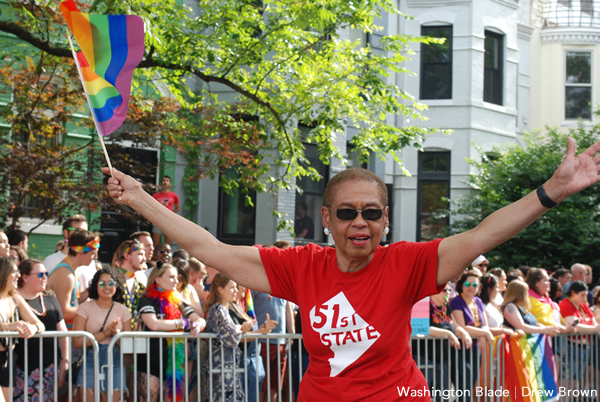
Her decision not to run for another term in office also comes at a time when, for the first time in many years, several prominent candidates emerged to run against her in the June 2026 D.C. Democratic primary. Among them are D.C. Council members Robert White (D-At-Large) and Brooke Pinto (D-Ward 2).
Others who have announced their candidacy for Norton’s seat include Jacque Patterson, president of the D.C. State Board of Education; Kinney Zalesne, a local Democratic party activist; and Trent Holbrook, who until recently served as Norton’s senior legislative counsel.
“For more than three decades, Congresswoman Norton has been Washington, D.C.’s steadfast warrior on Capitol Hill, a relentless advocate for our city’s right to self-determination, full democracy, and statehood,” said Oye Owolewa, the city’s elected U.S. shadow representative in a statement. “At every pivotal moment, she has stood firm on behalf of D.C. residents, never wavering in her pursuit of justice, equity, and meaningful representation for a city too often denied its rightful voice,” he said.
Sharon Nichols, who serves as press spokesperson for Norton’s congressional office, couldn’t immediately be reached for a comment by Norton on her decision not to seek another term in office.
Uganda
LGBTQ Ugandans targeted ahead of country’s elections
President Yoweri Museveni won 7th term in disputed Jan. 15 vote

Barely a week after Ugandan President Yoweri Museveni secured a 7th term in an election marred by state violence, intimidation, and allegations of fraud, the country’s queer community spoke about how the election environment impacted it.
The LGBTQ lobby groups who spoke with the Washington Blade noted that, besides government institutions’ failure to create a safe and inclusive environment for civic participation by all Ugandans, authorities weaponized the Anti-Homosexuality Act to silence dissent and discourage queer voter engagement.
The rights groups note that candidates aligned with Museveni’s ruling National Resistance Movement — including Parliament Speaker Anita Among — during the campaigns accused their rivals of “promoting homosexuality” to discredit them while wooing conservative voters.
Queer people and LGBTQ rights organizations as a result were largely excluded from the formal political processes for the election as voters, mobilizers, or civic actors due to fear of exposure, stigma, violence, and legal reprisals.
“This homophobic rhetoric fueled public hostility and emboldened vigilante violence, forcing many queer Ugandans into deeper hiding during the election period,” Uganda Minority Shelters Consortium Coordinator John Grace stated.
Some queer people had expressed an interest in running for local council seats, but none of them formally registered as candidates or campaigned openly because of safety concerns and local electoral bodies’ discriminatory vetting of candidates.
“UMSC documented at least three incidents of election-related violence or intimidation targeting LGBTQ+ individuals and activists,” Grace noted. “These included harassment, arbitrary detentions, extortions by state and non-state actors, digital cat-fishing, and threats of outing.”
Amid such a militarized and repressive election environment, Let’s Walk Uganda Executive Director Edward Mutebi noted queer-led and allied organizations engaged in the election process through restricted informal voter education, community discussions, and documenting human rights violations.
“Fear of backlash limited visibility and direct participation throughout the election cycle,” Mutebi said. “But despite the hostile environment of work, Let’s Walk Uganda was able to organize a successful transgender and gender diverse youth training on electoral security and safety.”
Museveni’s government escalated its repressive actions during the Jan. 15 elections by shutting down the internet and suspending nine civil society organizations, including Chapter Four Uganda and the National Coalition of Human Rights Defenders, for allegedly engaging in activities that are prejudicial to the security and laws of the country.
The suspension of the rights organizations remains in force, an action both Mutebi and Grace condemn. They say it prevents queer Ugandans from accessing urgent services from the affected groups.
“For the LGBTQ community, the impact has been immediate and deeply harmful. Many of the suspended organizations, like Chapter Four Uganda, were critical partners in providing legal representation, emergency response, and documentation of rights violations,” Grace said.
This has compelled UMSC and its other partners to handle increased caseloads with limited resources, while navigating heightened scrutiny and operational risk.
“The suspension has disrupted referral pathways, delayed urgent interventions, and weakened collective advocacy for marginalized groups and minority rights defenders, which calls for urgent international solidarity, flexible funding, and protection mechanisms to safeguard the work of grassroots organizations operating under threat,” Grace stated.
Mutebi warned that such repressive actions are tyrannical and are indicative of shrinking civic space, which undermines democratic accountability as the promotion and protection of human rights is ignored.
With Museveni, 81, extending his tenure at State House from a landslide win of 72 percent, UMSC and LWU consider a bleak future in the protection of rights for queer Ugandans and other minority groups.
“Without significant political and legal shifts, LGBTQ persons will face continued criminalization, reduced civic space, and heightened insecurity, making sustained advocacy and international solidarity more critical than ever,” Mutebi said. “ It is unimaginable how it feels to live in a country with no hope.”
Grace, however, affirmed the resistance by local queer lobby groups will continue through underground networks, regional solidarity, and digital organizing.
The duo noted that a win by Museveni’s main challenger and rapper, Bobi Wine, who only managed 24 percent of the total votes cast, could have enabled the opening up of civil space and human rights protections in Uganda.
Wine, for his part, spoke in favor of the respect for the rule of law and human rights during his campaign.
“While Bobi Wine’s past stance on LGBTQ rights was inconsistent, his recent shift toward more inclusive rhetoric and international engagement suggested a potential opening for dialogue,” Grace said. “A win might have created space for policy reform or at least reduced state-sponsored homophobia, though structural change would still require sustained pressure and coalition-building.”
Mutebi stated that a change in Uganda’s leadership to a youthful leader like Wine could have offered an opening, but not a guarantee for progress on inclusion and human rights. Mutebi added existing institutionalized and societal homophobia remain in place.



















